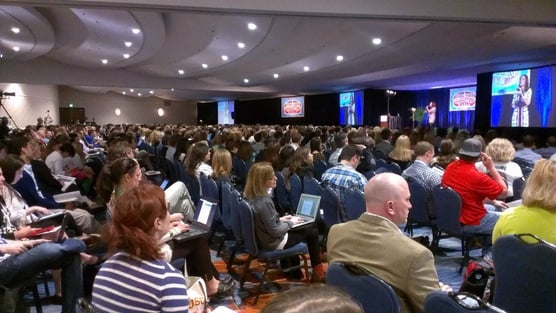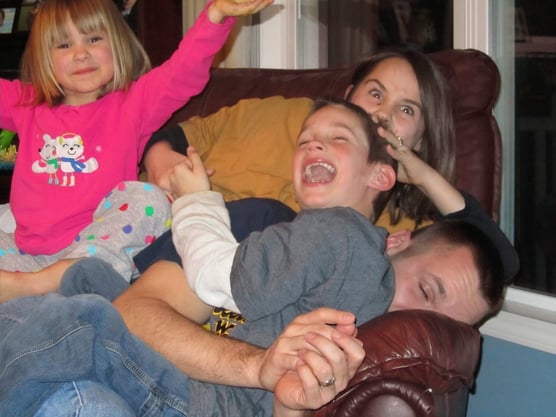Subscribe now and get the latest podcast releases delivered straight to your inbox.
Those of you that know me, know that I’m a passionate fan of great communication in all its forms—be it presenting to small groups or speaking to a thousand people for a conference keynote.
And having been to 9 different speaking events in the last month, I’ve been reminded of a few skills and principles that few people do, but can make all the difference when trying to make a lasting impact on audience and listeners.
1. Name Memorization Techniques
The other day I was speaking to a smaller group of about 35 people. Having arrived at another speaker’s presentation an hour before my slotted time to present, I had the event organizer write down on a sheet of paper each person that was in the room, in conjunction with where they were sitting. Over the next 60 minutes, by using a mnemonic technique, I was able to memorize everyone’s name and could literally call out each person with the snap of a finger. As you might imagine, audience members were shocked when they realized I knew all their names, which led to a tremendous experience for all of us over the next 90 minutes.
This certainly isn’t the first time I’ve done this with a smaller audience, but I can tell you its impact on listeners is profound every time. And even though this technique can’t be accomplished with much larger audiences, you can still pick out 10-20 audience member names to memorize beforehand, and then call on those very people once you start speaking.
As the old saying goes, “People don’t care how much you know until they know how much you care.” By taking the time to become familiar with audience names (and any other personal information for that matter) is a sign you care, and will get powerful results every, single time.
2. Why Name Tags are a Must
I’m going to stick with the principle of names for a moment and discuss the importance of name tags. As the incredible Dale Carnegie once said, “Nothing is more sweet than the sound of one’s own name.”
Whether we want to admit it or not, this statement is true. We do love the sound of our own name. We also like it when others call/address us by name.
It is for this reason that I require every place I speak to use name tags with attendees. In fact, I’m so serious about the principle of calling people by their name that I carry an extra set of sticky-tags on me just in case the event’s organizer forgot to set things up properly.
By doing this, audience involvement is enhanced tremendously and your ability as a speaker to make powerful connections with said audience will be facilitated and heightened.
3. The Law of Spatial Intimacy
I’m going to write an entire book at some point on the following subject, but the Law of Spatial Intimacy (my word) goes like this—The closer people are seated together in an audience, the more ability for the speaker and the audience alike to create a moving and powerful experience.
To help explain this law on a deeper level, think about the last time you went to an “amazing” conference: Were the rooms full of people or was attendance sparse? Did it feel like the speaker was close to the audience or far away? Were there many empty seats or were people lined up against the walls?
Hopefully you see where I’m going with this, and just why the skill of creating and promoting intimacy through proximity is a HUGE deal when it comes to audience related events.
To give you an example of how this can be leveraged as a speaker, let’s look at an experience I had this past week while speaking to a group of high-end plumbing, kitchen, and bath retailers. In this particular event, we were located in a room that had 4 sections of seats with about 100 seats in each section. As the 200 audience members sat down, they were spread out across these 4 sections, and I could see clearly no one would be “rubbing-shoulders” if I accepted things as they were.
So instead of just accepting the situation as it was, I told everyone to move to the two inner sections, therefore creating a stronger feeling of togetherness and intimacy within the group and myself as well—a move that led to another tremendous experience with the audience.
4. The Power of Music to Set the Tone
Music is magical. It moves us. It changes our mood. It gets our juices flowing.
This is exactly why I play music (often with video) before every talk I give—as it creates a tone and vibe that gets audience members excited, upbeat, and ready to learn.
Ever been to a conference that was dead-silent before the speaker got in front of the audience? Yeah, it’s not too good, especially because silence often leads to people getting lost in their cell phones, checking their inboxes, etc.
5. Explaining the Deeper “Why”
Most of you have heard me discuss Simon Sinek’s “Start With Why” in the past, but when it comes to giving a great presentation, I want you to consider “End With Why.” And what do I mean with this phrase? Simple:
Everything we teach at a conference—no matter what the subject is—is ultimately meant to provide listeners with one thing: Time
Many people think if I’m talking about marketing, then I’m really talking about how companies can make more money. And although this is partially true, “money” is not the “why” of my message. But what money can bring us—financial peace to do that which we love most with our TIME—now that’s the “why” of all the speaking I do. It’s the core of my message, whether it’s sales, marketing, personal development, etc. Each one of these subjects, at least to me, has EVERYTHING to do with having more time and freedom in our life to do that which brings us the most joy.
It is for this reason that I end so many of my talks showing a photo of my family, and telling audience members how following the principles of inbound and content marketing (or anything else I’ve taught) have changed my life, given me financial freedom, and allowed me to be with my wife and kids more than I ever could have dreamed of just five years ago.
Your Turn
So there you have it folks, 5 presentation techniques that can have a lasting impact on your audience and help you to get great results whenever you speak in the future. I’m curious, which of these 5 have you done? What were the results? Also, what “outside the box” techniques would you add to the list?


Order Your Copy of Marcus Sheridan's New Book — Endless Customers!



